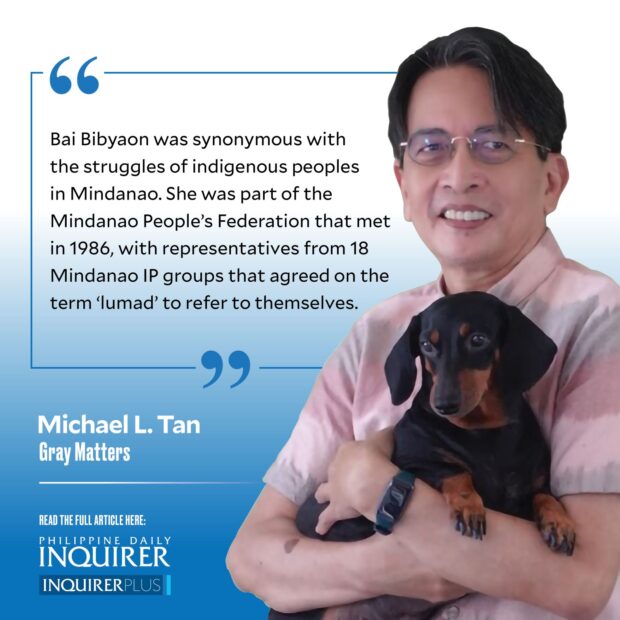Simply Bai, Bibyaon

Writing this tribute—I don’t want to call it an obituary—was difficult, because she was truly legendary. Her “real” name was Ligkayan Bigkay but in the decade I knew her, she was always, simply, Bai, an honorific term used for women in different parts of Southeast Asia. Bibyaon was another honorific term bestowed on her to recognize her leadership, a chieftain. In effect, we were calling her “Chief chief.” This tiny woman of a chief stood tall, much venerated, respected, and loved.
Bai Bibyaon passed away last Nov, 20, age unknown. I did ask her once and she just smiled. After she died, the tributes made all kinds of claims including “over a hundred,” others estimating 80s and 90s. I’m inclined to rely on more conservative estimates that have her born during the Japanese Occupation, measuring her age by her activism.
It seems she first emerged in the news during the Marcos regime, leading fellow villagers against the logging company Alcantara and Sons. Although the conflict was supposedly resolved, it was replaced by many other problems, particularly, in the Duterte era, by mining companies accompanied by the murderous paramilitary force Alamara.
She is described as having been born and lived in the Pantaron mountain range in central and southern Mindanao but again the accounts are not clear where in this huge expanse of land straddling six provinces. She is described as Matigsalug in some accounts and Talaingod in others, but I think all the Manobo—several distinct but related ethnolinguistic groups—like to think of her as their mother.
Bai Bibyaon never married, which is rare among indigenous peoples, where child marriages are still arranged and forced. She opposed these marriages, pushing to keep young girls in school as a way out of poverty. The harsh reality was that child marriages worsened the poverty for the girls because it meant they had to drop out of school, as early as the onset of puberty, and then raise a family. Bai Bibyaon herself was illiterate, never having gotten a formal education.
Bai Bibyaon was synonymous with the struggles of indigenous peoples in Mindanao. She was part of the Mindanao People’s Federation that met in 1986, with representatives from 18 Mindanao IP groups that agreed on the term “lumad” to refer to themselves.
It was the lumad groups, at the forefront of resistance to companies encroaching into IP ancestral lands, who set up an extensive network that, at one time, counted 55 elementary and high schools that produced some of the first lumad high school graduates. A handful went on to college, usually to take education, always an uphill struggle even with low tuition costs.
It was through this network that I met Bai Bibyaon. As chancellor of University of the Philippines (UP) Diliman, I agreed in 2015 to let a small delegation of indigenous peoples and Muslims hold a Manilakbayan in Diliman, as part of a public education campaign. This was repeated in the years that followed, with larger delegations, some co-hosted by other universities notably the University of Santo Tomas. I called them our visiting researchers and professors. To this day, I still run into UP faculty and students (now alumni) with fond memories of their interactions with the lumad.
Not surprisingly, lumad was the target of a campaign of Red-tagging. Most of the lumad schools were closed down—several burned down—and the leaders harassed, several assassinated. Bai Bibyaon had to go into hiding several times as the military claimed she had been kidnapped and wanted her in custody.
Meanwhile, Bai Bibyaon had become truly a datu of sorts that transcended the different tribes not just of the Manobo (a generic term similar to “Mangyan” for Mindoro or “Igorot” for the Cordillera) but of the lumad of Mindanao. Everyone claimed her as their own; she had awards from all over, from the University of the Philippines’ Gawad Tandang Sora to the Ulirang Nakatatanda Award from the Coalition of Services for the Elderly to Amnesty International US’ Ginetta Sagan Award.
Bai is remembered for her quiet and low-key, but powerful, presence. She never demanded anything, although her fellow lumad would send word when she ran out of betel nut (nganga), which forced me to become an expert at tracking down the Metro Manila sources of this powerful stimulant. The other week I was in the vicinity of Quiapo and, almost instinctively, thought of getting her some nganga and then remembered she had gone home to the Pantaron mountain range in the sky.
I wondered if she knew of plans of the government, announced last year, to declare parts of the Pantaron range a “protected area.” The Department of Environment and Natural Resources press release acknowledged the rich resources in Pantaron, including the “last remaining old growth (forests) and the headwater source of several rivers.”
mtan@inquirer.com.ph




















